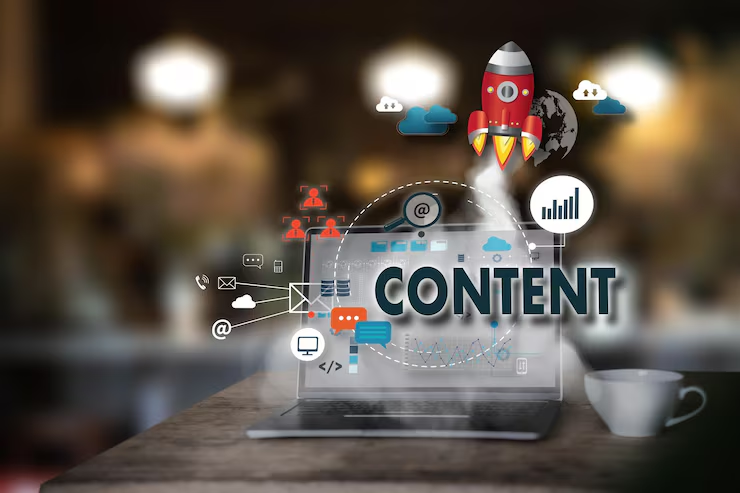
Quick Summary:
Large language models (LLMs) like GPT-4 and GPT-5 are revolutionizing B2B content marketing by enhancing speed, personalization, and efficiency. These AI tools are now essential partners in strategy, research, and engagement, helping marketers create high-quality content quickly, tailor messages to specific audiences, optimize for SEO, and automate lead nurturing. Combining LLMs with custom software development can further amplify marketing impact and ROI.
Key Points:
- Accelerates high-quality content creation, maintaining brand consistency while reducing reliance on large writing teams.
- Enables highly personalized, data-driven messaging targeted by industry, company size, and role.
- Optimizes keyword usage and SEO to increase visibility and attract quality leads.
- Summarizes extensive content and automates adaptive email campaigns for better lead nurturing.
- Integrates with marketing platforms for real-time insights, content customization, and multi-channel automation.
Table of Content
| Introduction – LLMs in B2B Marketing1. Quick Content Creation2. Extremely Personalized Messaging3. Enhanced Keyword Optimization and SEO4. Smart Content Summarization5. Improved Lead Nurturing Using AI-Powered Email Marketing6. Data-Driven Content Recommendations7. Social Media Strategy with AI Support8. Improved Research and Competitive Analysis9. Scripts for Multimedia and Scalable Video10. Integration with Sophisticated Marketing PlatformsConclusionFAQs Related to “LLMs in B2B Marketing” |
Introduction – LLMs in B2B Marketing
The way that B2B firms approach content marketing is changing as a result of the emergence of big language models (LLMs) such as GPT-4 and GPT-5. These sophisticated AI models are no longer simply tools for producing text; they are evolving into crucial partners in strategy, study, and interaction.
B2B marketers are utilizing LLMs in 2025 to optimize processes, increase personalization, and boost ROI. LLMs are changing what’s possible in content marketing, from blog writing to automated insights.
This essay examines ten potent methods in which LLMs are fostering success in B2B content marketing and how companies may take advantage of this technology by combining Content Marketing with Custom Software Development for Businesses when necessary.
1. Quick Content Creation
Marketing teams can increase output without compromising quality because LLMs are capable of producing high-quality material at a rapid rate. For organizations that sell to other companies, this entails creating blog entries, case studies, white papers, and social media updates more quickly than before.
Benefit:
Maintains consistent brand messaging while accelerating content calendars and decreasing dependency on big internal writing teams.
2. Extremely Personalized Messaging
Messages that are targeted to the industry, firm size, or position of B2B consumers are more effective. LLMs are capable of analyzing customer data and creating unique emails, landing pages, and proposals that appeal to particular decision-makers.
Example:
Using AI-driven insights, a software SaaS firm may create unique outreach content for CTOs as opposed to CMOs.
3. Enhanced Keyword Optimization and SEO
LLMs use search trends to find the best keywords and produce content that is optimized for search engines. With this, companies can rank higher in Google results and get high-quality traffic.
Benefit:
Increased visibility for valuable B2B inquiries leads to higher lead quality and more inbound conversions.
4. Smart Content Summarization
Long reports, research papers, or webinars can be condensed into clear, understandable forms by LLMs. Particularly helpful for decision-makers who require information immediately.
Application:
creating executive briefs from extensive industry reports or summarizing quarterly market research.
5. Improved Lead Nurturing Using AI-Powered Email Marketing
B2B marketers can utilize LLMs to create automated email campaigns that change depending on how users interact with them and behave. Emails are timely, relevant, and tailored, increasing open rates and conversions.
6. Data-driven Content Recommendations
To identify the subject matter that is most likely to appeal to a target audience, LLMs examine engagement data. This guarantees that your business-to-business marketing plan stays current and targeted.
Impact:
Minimizes unproductive labor on subpar material and optimizes return on investment for content marketing initiatives.
7. Social Media Strategy with AI Support
By identifying popular hashtags that are relevant to a commercial audience, LLMs may write articles and provide the best times to publish. With little manual effort, this enables marketing teams to have a consistent and engaging social media presence.
8. Improved Research and Competitive Analysis
LLMs are capable of identifying market gaps, analyzing rival material, and summing up industry trends. With this knowledge, marketers may develop content that strategically positions their brand.
Example:
An LLM may be able to spot gaps in a rival company’s collection of case studies or white papers, allowing your company to fill that void.
9. Scripts for Multimedia and Scalable Video
In B2B material, video marketing is gaining importance. Because LLMs can produce scripts for webinars, podcasts, and explainer videos, they speed up and improve the process of making multimedia content.
Benefit:
reduces campaign production timelines without sacrificing message consistency.
10. Integration with sophisticated marketing platforms
Real-time insights, content customization, and performance tracking are all made possible by the seamless integration of LLMs with content marketing solutions and automation platforms.
For instance, companies can create tailored tools that automatically create, distribute, and optimize content across several channels by combining LLM capabilities with custom software development for business.
Conclusion
By enhancing efficiency, personalization, and performance, large language models are transforming B2B content marketing. For marketers aiming to grow their operations strategically, LLMs offer strategic advantages ranging from fast content development to data-driven suggestions.
In the cutthroat business environment of 2025, firms who embrace LLM-powered solutions today, while also making use of personalized AI-driven software and Content Marketing Solutions, will stand out from the crowd.
FAQs related to “LLMs in B2B Marketing”
1. Are LLMs suitable for all types of B2B industries?
LLMs are versatile and can be adapted to different B2B sectors, but effectiveness depends on quality data and proper customization.
2. What are the limitations or challenges of using LLMs in B2B marketing?
Challenges include ensuring data privacy, managing AI biases, and maintaining human oversight for quality control and strategic alignment.
3. Can LLMs be used to create multimedia content for B2B marketing?
Yes, LLMs can generate scripts for webinars, podcasts, and explainer videos, accelerating multimedia content production while maintaining message consistency.
4. Can LLMs optimize content for search engines?
Yes, LLMs identify trending keywords and produce SEO-optimized content to improve search rankings, increase visibility, and attract valuable leads.
5. How do LLMs improve content creation for B2B marketing?
LLMs enable faster production of high-quality content such as blogs, white papers, and social media updates, helping maintain consistent brand messaging while accelerating content calendars.
6. What are large language models (LLMs) and how are they used in B2B marketing?
LLMs like GPT-4 and GPT-5 are advanced AI models used in B2B marketing to create content, personalize messaging, optimize SEO, and automate marketing tasks, enhancing overall marketing strategy and efficiency.




More Stories
Effective Link Building Strategies for Law Firms That Drive Real Results
Effective Link Building Strategies for Law Firms That Drive Real Results
Top Link Building Agencies in Los Angeles to Boost Your SEO in 2026